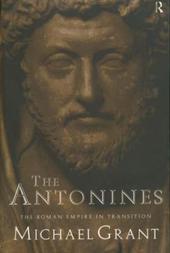
|
The Antonines: Roman Empire in Transition
Paperback
Main Details
| Title |
The Antonines: Roman Empire in Transition
|
| Authors and Contributors |
By (author) Michael Grant
|
| Physical Properties |
| Format:Paperback | | Pages:224 | | Dimensions(mm): Height 234,Width 156 |
|
| Category/Genre | European history
World history - BCE to c 500 CE |
|---|
| ISBN/Barcode |
9780415138147
|
| Classifications | Dewey:937.06 |
|---|
| Audience | | Undergraduate | | Postgraduate, Research & Scholarly | |
|---|
| Illustrations |
27 b/w plates
|
|
Publishing Details |
| Publisher |
Taylor & Francis Ltd
|
| Imprint |
Routledge
|
| Publication Date |
2 May 1996 |
| Publication Country |
United Kingdom
|
Description
The Antonines - Antonius, Pius, Marcus Aurelius, Lucius Verus and Commodus - played a crucial part in the development of the Roman Empire, controlling its expansive machine for half a century if its most testing period. A period of social and political change when art and literature flourished, but which has left many unanswered questions, surrounding the treatment of the Christians and the reputations of key figures, such as Commodus. As well as offering answers to many of the questions this period has provoked, this work tells of the events which were to transform the Roman Empire from its ancient mould and bring it into the Middle Ages.
ReviewsKirkus Review US:The distinguished, prolific classical historian (Constantine the Great, p. 681, etc.) here critically examines the reigns of the Roman Empire's three Antonine emperors (A.D. 138-192). Eighteenth-century historian Edward Gibbon considered the reigns of Antoninus Plus (A.D. 138-161) and Marcus Aurelius (A.D. 161-180) the period "during which the condition of the human race was most happy and prosperous." Grant looks carefully at this traditional view of the Antonine Pax Romana and points out that during Antoninus Pius's long rule there were disturbances in Greece, Britain, Dacia, Judaea, and Africa; he also criticizes Pius's administration as static, backward-looking, and uncreative, though competent enough. At his death, in a decision that presaged the disastrous power-sharing arrangements of the later empire, Antoninus Plus bequeathed a shared authority to Marcus Aurelius and Lucius Verus (who died a natural death in A.D. 169). Aurelius, author of the Stoic classic Meditations, ruled successfully during a turbulent period; he had to stave off challenges to Roman role in Britain and Gaul, fight wars against the Parthians and on the Danube frontier, and govern an empire riven by a grave pestilence. Weakened by "incessant winter campaigning," he died on the Danube frontier in A.D. 180, leaving the empire in the hands of his son, the cruel megalomaniac Commodus (A.D. 180-192), whose reign is noteworthy mainly for its absolutism and arbitrary violence. Grant reviews Antonine art, architecture, literature, and rhetoric, arguing that thematically (the rejection even by pagan writers of classical paganism) and in style and form (the works of Apuleius presage the modern novel) Antonine culture marks a transition from the ancient to the early medieval world. With characteristic lucidity, Grant shows that Rome during its vaunted "golden age" contained seeds of its future collapse and of the Europe to come. (Kirkus Reviews)
|